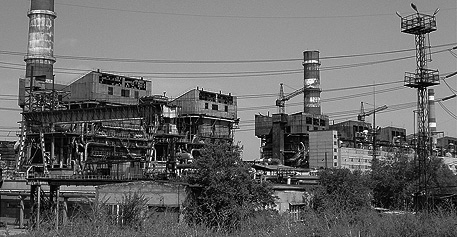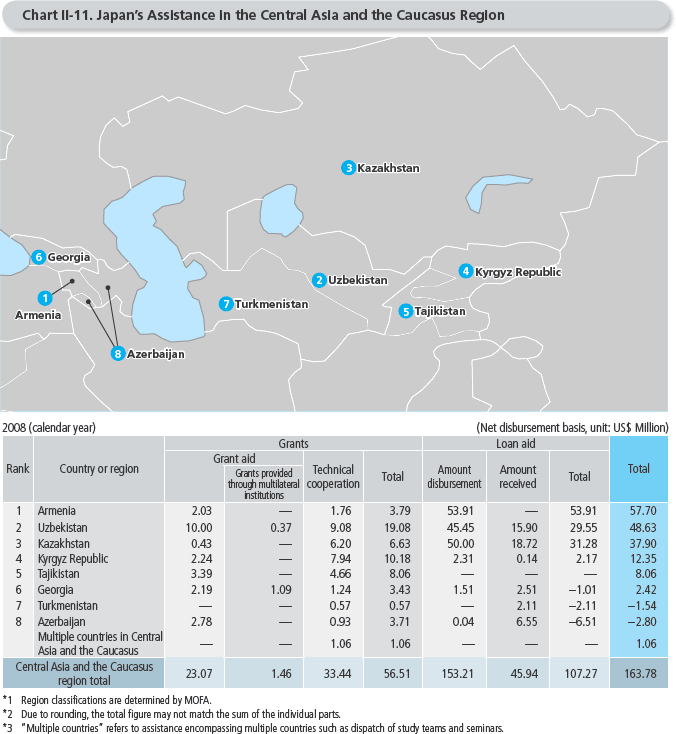Japan's Official Development Assistance White Paper 2009
3. Central Asia and the Caucasus
•Approximately US$163.78 million (approximately US$297.2 million)
•Approximately 2.4% of total bilateral aid (approximately 1.4%)
Central Asia and the Caucasus regions are a geopolitically strategic area due to their proximity to Russia, China, South Asia and the Middle East. The regions are also strategically important to Japan as they have a large abundance of natural resources including oil, natural gas, uranium, and rare metals. Japan provides nation-building support to each country in order to establish long-term stability and sustainable development in the regions, and in consideration of a broader regional perspective including regions that border Central Asian nations such as Afghanistan and Pakistan, hoping to help radiate basic values such as human rights, democracy, market economies, and rule of law.
<Japan's Efforts>
In order to facilitate the transition from a planned economy to a market economy and realize economic development, Japan has provided a diverse range of assistance activities, including for social sector reconstruction such as for improvement of legal institutions and health and medical care, developing infrastructure for shifting to a market-based economy and economic development, and the development of human resources for institution-building. For example, Japan Center for Human Development ("Japan Center") has been established in Uzbekistan, Kazakhstan, and Kyrgyz Republic as bases for human resource development assistance. At these centers, business courses and other activities are provided based on Japan's experiences, through which they contribute to cultivation of human resources that can be ready for the introduction of the market economy in the region. Also, dialogue and collaboration have been undertaken at various levels under the framework of the "Central Asia plus Japan" Dialogue—established with the aim of promoting cooperation within the region in 2004.
There are many oil fields boasting world-class reserves on the coast of the Caspian Sea in Kazakhstan and Azerbaijan, in which Japanese enterprises partially own their interests. The oil being exported from these fields runs through pipelines passing through Central Asia and the Caucasus. Therefore, stability and economic development in this region are important for stabilizing the international energy market as well as for securing access to energy resources. Japan provides assistance to this region such as improving public services, cultivating human resources, and developing infrastructure, including power plants.
Yerevan Combined Cycle Co-Generation Power Plant Project (Armenia)
Many power plants in Armenia were constructed during the days of the former Soviet Union, and thus have been in operation for nearly 30 years. The facilities are aging and have suffered marked decline in power supply capacity and reliability. Therefore, there are concerns about the potential occurrence of serious power shortages in the future. Japan provides aid for new construction of a combined cycle co-generation (Note 41) power plant in an adjacent area to a thermal power plant in the suburbs of Armenia's capital of Yerevan, thereby assisting in the expansion of power supply capacity, mitigating power shortages, and contributing to stable and sustained socioeconomic growth. Provision of the ODA loan commenced in 2005, and, in FY 2008, an additional ODA loan was provided in order to respond to increased project costs resulting from skyrocketing steel and turbine prices.

Complete view of the old power plant (Photo: JICA)
Notes:
(41) An energy supply system that utilizes exhaust heat simultaneously generated from electrical power generation for thermal demand.

